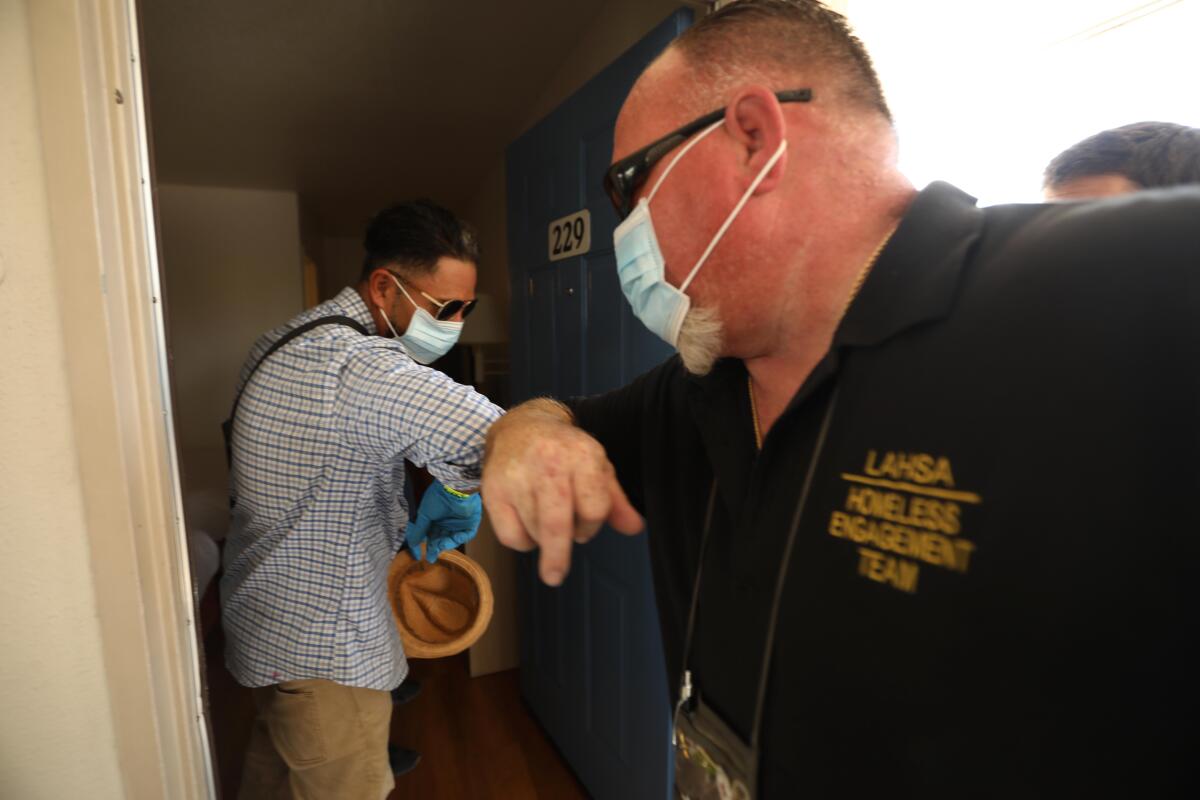COVID is still here, and homeless people still need to be in hotel rooms

- Share via
Faced with two crises last spring — the pandemic and homelessness — the city and County of Los Angeles did something remarkable: They sheltered homeless people faster than ever and in rooms of their own, not group settings, under a program called Project Roomkey.
At its peak last year, the program provided rooms in hotels or motels with service providers for about 4,300 homeless people who, due to age or underlying health conditions, were considered particularly vulnerable to COVID. The Federal Emergency Management Agency had initially pledged to cover 75% of the costs, but after the program started to wind down, the Biden administration raised reimbursements retroactively to 100% and declared that the program would continue through September.
Instead of embracing the opportunity for more federal help and hunting down thousands more rooms, county officials announced that they would stop looking for new hotel partners and stick with 10 — with about 1,000 rooms — in their portfolio. The county chief executive said it would be too burdensome to pay millions of dollars up front to more hotels while waiting months or longer to be reimbursed by FEMA.
Los Angeles Mayor Eric Garcetti expressed similar concerns at first. Since then, however, the city has found $75 million to borrow from a city Department of Building and Safety trust fund to keep running Roomkey.
The reality, though, is that the pandemic won’t be over for several more months at least. And the homelessness crisis won’t be over for years. Yes, leasing hotel rooms is just a temporary fix. Permanent housing is, obviously, the real solution. Still, while there is federal money on the table to rent hotel and motel rooms through Roomkey, officials should continue to take advantage of it.
It is ridiculous that FEMA takes so long to reimburse local governments, but it’s also ridiculous that the city is only now in the process of applying for the $59 million it was owed for the Roomkey program that started last spring. To the city’s credit, it did put in for the $100 million that FEMA owes it for COVID testing expenses (which are apparently less onerous to file than the Roomkey expenses). And it has gotten almost a third back. What if it had been quick to seek the Roomkey money too? A delay in filing means just more delay in the already slow reimbursement process.
Wooing larger hotels into Project Roomkey was challenging in the spring. Although more than three dozen hotels and motels across the county participated, city officials met with resistance from some of the larger hotels in or near downtown. Eventually the city got a few that yielded hundreds of rooms.
It may be even more difficult to persuade them now, given that hotels are expecting occupancy rates to go up as the city begins to reopen. The Hotel Assn. of Los Angeles recently provided a list of 53 interested hotels with 3,100 rooms across the county. Only 11 are in the city of L.A. And some of those are quite small, which is an inefficient way to deploy the on-site service providers that are crucial to the program’s success. Still, the city needs to look at those smaller facilities.
Currently, the city has about 1,100 rooms under lease and is close to getting four additional motels that will add 200 more rooms. But far more are needed. City and county officials should go back to the hotels that turned them down last year and those that left the program when their leases ended. If a hotel is partially booked, officials should offer to work around those bookings. City officials say they are already doing much of this hustling already. That’s good. County officials should follow their example.
Perhaps the biggest worry for officials and service providers is the grim possibility of thousands of homeless people in hotels with no place to go when Roomkey shuts down in September. That’s a serious concern. But that uncertainty now shouldn’t stop the sheltering of people in hotels until early fall.
The city and county also have to focus on bringing more transitional and permanent housing online. One of the most promising ways is through Project Homekey, a state program that offered funds last fall to buy hotels, motels and apartment buildings. The county and the city bought a number of sites and are working on turning them into housing for homeless people. Gov. Gavin Newsom has proposed financing more Homekey purchases in the fiscal year that starts July 1. Ultimately, these hotels and motels could play a big part in the future of housing for homeless people.
More to Read
A cure for the common opinion
Get thought-provoking perspectives with our weekly newsletter.
You may occasionally receive promotional content from the Los Angeles Times.









